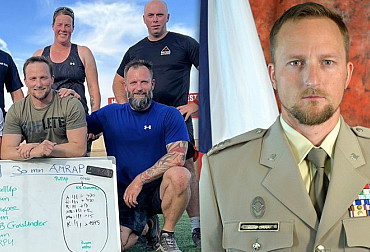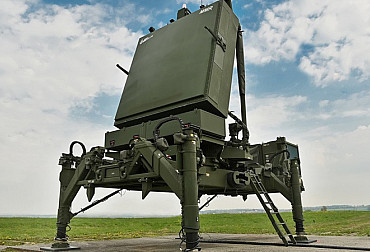Training soldiers for survival is different to cooking classes
Each soldier has to complete the so-called S.E.R.E. training before leaving for a foreign operation. They learn how to survive in distress in the enemy territory and get back to safety. The soldiers of the 25th anti-aircraft missile regiment in Strakonice, who will operate within the Alliance’s Forward Presence in Lithuania from July next year, have been also undergoing similar courses.

Picture: Soldiers are ready to be picked up by the Rescue Team | army.cz
A number of factors can affect the survival and rescue of people. “It is not a cooking course when the instructor tells you what ingredients to add in the pot and what will come out of it. In spite of the fact that you follow all the basic rules, an unexpected complication may appear and the rescue is not successful,” warns the Captain Lukáš Perný who is the leader of the S.E.R.E. courses in the unit in Strakonice.
The term S.E.R.E. is an abbreviation of the English words Survival, Evasion, Resistance and Extraction. They can be translated into Czech as ‘přežití, únik, odolnost and exfiltrace’.

Picture: Neither side usually knows each other. Therefore, the rescue team does not treat soldiers with kid gloves. The rescue team has to make sure that these are the people to be picked up. | army.cz
Soldiers only have a notebook and a pencil
The soldiers organize the training with such a description mostly in winter. Nevertheless, the summer courses are not an exception due to high demand. “In such cases, we take away almost all the equipment from the soldiers and leave them only a notebook and a pencil. We need to create an uncomfortable situation for them,” states the Captain Lukáš Perný. “We teach soldiers how to behave in a crisis situation, after a specific stressful event. For instance, when the crew of a shot down helicopter finds itself in the enemy territory. In such a case, the soldiers have half a minute, a maximum of one minute, to orientate themselves, pack things and leave the area,” describes the Captain Perný the condition that the soldiers can get into during the operational deployment.

Picture: After the pickup, further identity verification of the soldiers takes place | army.cz
The soldiers learn basic skills during the training, including building shelters, lighting fires or preparing food. They thoroughly practice the principles that govern the rescue of people. The instructors blindfold the soldiers and drop them off in an unfamiliar terrain. They have to orientate themselves on the map, camouflage themselves and tactically move to the stated destination. Here they practice the case when they are picked up by the rescue team.
They train the pickups three times
“Neither side usually knows each other. The soldiers must not endanger the rescue team by their behaviour. They must follow all procedures as they are required so that the rescue team can identify, pick them up and transport them safely to safety. We practice this phase with the soldiers three times – during the day, at night and at dawn,” explains the Captain Perný that picking up people has its specificities at every time of the day.

Picture: For instance, soldiers also train how to get out of improvised cuffs | army.cz
During the training, the soldiers will apply their skills that they have acquired since the beginning of their career in the army. Random camouflaging, moving a soldier around the battlefield or using fasteners – that is all they may need for their rescue. “During the training of the S.E.R.E., the soldiers have to be able to apply all this knowledge in practice. Following this, they gain new knowledge, especially in the issue of rescuing people,” adds the Captain Lukáš Perný.
They pass on real experience from abroad
Instructors try to pass on not only the experience from foreign operations to the soldiers but, in general, the maximum amount of information that may be useful to them in a crisis situation. The course of training is supervised not only by the S.E.R.E. instructors, but also the specialists in military swimming, moving on snow and ice and other military disciplines.

Pictue: During the training they get acquainted with the different ways how to get and filter water (in the picture). Then, they also practice, for instance, how to start a fire by means of natural material or how they improve in building improvised shelters. | army.cz
“We are facing a low number of instructors who are authorized to conduct the S.E.R.E. trainings. Nevertheless, we have positive feedback from the participants which motivates us to continue working. Of course, we are aware that everything can still be improved,” notes the Captain Lukáš Perný.





















